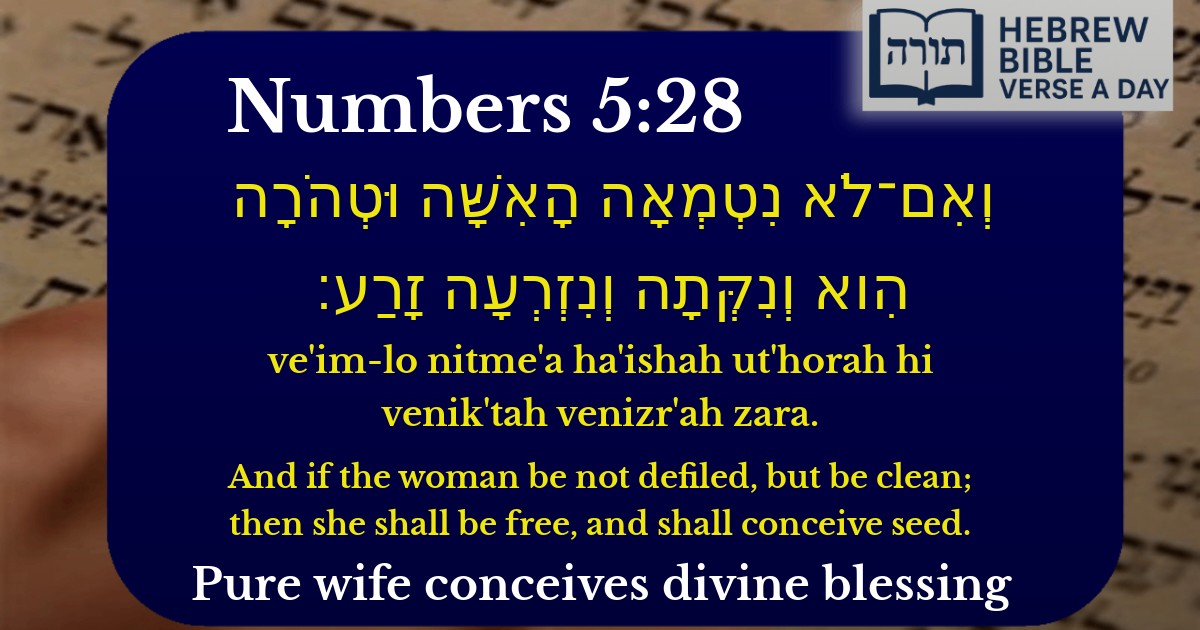Join Our Newsletter To Be Informed When New Videos Are Posted
Join the thousands of fellow Studends who rely on our videos to learn how to read the bible in Hebrew for free!
Hebrew Text
וְאִם־לֹא נִטְמְאָה הָאִשָּׁה וּטְהֹרָה הִוא וְנִקְּתָה וְנִזְרְעָה זָרַע׃
English Translation
And if the woman be not defiled, but be clean; then she shall be free, and shall conceive seed.
Transliteration
Ve'im-lo nitme'a ha'ishah ut'horah hi venik'tah venizr'ah zara.
Hebrew Leining Text
וְאִם־לֹ֤א נִטְמְאָה֙ הָֽאִשָּׁ֔ה וּטְהֹרָ֖ה הִ֑וא וְנִקְּתָ֖ה וְנִזְרְעָ֥ה זָֽרַע׃
וְאִם־לֹ֤א נִטְמְאָה֙ הָֽאִשָּׁ֔ה וּטְהֹרָ֖ה הִ֑וא וְנִקְּתָ֖ה וְנִזְרְעָ֥ה זָֽרַע׃
🎵 Listen to leining
Parasha Commentary
📚 Talmud Citations
This verse is quoted in the Talmud.
📖 Sotah 26a
The verse is discussed in the context of the laws concerning a woman suspected of adultery (Sotah) and the consequences if she is found to be clean.
📖 Niddah 31b
The verse is referenced in a discussion about purity and conception, relating to the laws of family purity.


Context in the Torah
This verse (Numbers 5:28) is part of the passage detailing the laws of the Sotah (a woman suspected of adultery), where a wife undergoes a trial by bitter waters (mei hamarim) to determine her innocence or guilt. If she is found innocent, this verse states she will be cleared of suspicion and blessed with offspring.
Rashi's Explanation
Rashi (Rabbi Shlomo Yitzchaki) comments that the phrase "וְנִקְּתָה" ("she shall be free") means she is acquitted of the suspicion of adultery. Regarding "וְנִזְרְעָה זָרַע" ("and shall conceive seed"), Rashi explains that if she was previously childless, she will now merit to bear children as a reward for undergoing this difficult ordeal with faith. This aligns with the Talmudic principle (Sotah 26a) that righteous suffering can lead to divine blessing.
Rambam's Perspective
Maimonides (Rambam) in Mishneh Torah (Hilchot Sotah 3:21) emphasizes that the Sotah ritual was a miraculous process designed to reveal truth. If innocent, the woman would not only be vindicated but also receive a blessing of fertility—demonstrating that God rewards those who endure trials for the sake of sanctifying His name.
Midrashic Insights
Halachic Implications
The Talmud (Sotah 26a) discusses whether the blessing of conception applies only if the woman was previously barren or even if she already had children. Rabbi Akiva holds that it is a general blessing for increased fertility, while the Sages limit it to those who lacked children. The Shulchan Aruch does not rule definitively but acknowledges both views, leaving room for divine discretion.